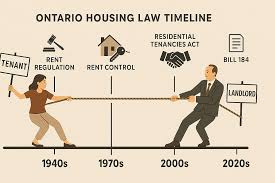In recent years, Canada has experienced a sharp rise in rent prices across most major cities, with average rents for one-bedroom apartments surpassing $2,000 per month in places like Toronto and Vancouver. This surge in housing costs has had wide-ranging consequences for the Canadian economy, influencing household spending patterns, consumer demand, and even long-term economic growth. As rent consumes a growing share of household income, Canadians are being forced to cut back on other essential and discretionary expenditures, leading to ripple effects throughout various sectors of the economy.
One of the most direct impacts of rising rent prices is the reduction in disposable income for renters. According to Statistics Canada, nearly half of renters now spend more than 30% of their income on housing, a level considered unaffordable by the Canada Mortgage and Housing Corporation (CMHC). For many, this figure is even higher, particularly in metropolitan areas where competition for limited rental units is fierce. When rent absorbs such a large portion of income, households have less money left to spend on goods and services such as groceries, transportation, clothing, and entertainment. This shift in spending patterns can dampen consumer demand—the primary engine of Canada’s economic growth.
The grocery sector has been particularly affected by these financial pressures. With food prices also rising due to inflation and supply chain disruptions, many households are trading down to cheaper alternatives or reducing the variety and nutritional quality of their diets. Consumers are more likely to buy in bulk, opt for discount brands, and cut back on eating out. This has hurt restaurants, cafes, and local eateries that rely on discretionary spending. Furthermore, grocery stores are seeing changes in consumer behavior, with reduced demand for premium or specialty items as families focus on basic necessities.
Similarly, the entertainment and leisure industries have suffered from the strain of high rent costs. When rent takes priority, activities such as going to the movies, attending concerts, or taking short vacations are often the first to be cut. This decline in discretionary spending has significant implications for local economies that depend on tourism, arts, and cultural events. The entertainment industry is also a major employer, particularly for young Canadians and part-time workers; therefore, a slowdown in consumer participation translates to fewer jobs and reduced income opportunities in these sectors.
Beyond the immediate effects on consumer spending, rising rents can also exacerbate broader economic inequalities. Younger Canadians, recent immigrants, and lower-income households are disproportionately affected by housing affordability challenges. Many are forced to relocate farther from urban centers to find affordable accommodation, which increases commuting costs and reduces their access to job opportunities and public services. This geographic and economic displacement can limit social mobility and reduce labor market efficiency, as workers may be unable to live near areas where their skills are in demand.
The rise in rent prices also influences inflation dynamics and monetary policy. As shelter costs are a significant component of the Consumer Price Index (CPI), their increase contributes directly to higher overall inflation. In response, the Bank of Canada may raise interest rates to curb inflationary pressures. However, higher interest rates make it more expensive for developers to build new housing and for prospective homeowners to purchase property, further constraining supply and perpetuating the affordability crisis.
In the long run, persistently high rent prices could undermine economic growth by weakening consumer confidence and household financial stability. When people are forced to allocate most of their income toward housing, they are less able to save or invest in education, entrepreneurship, or retirement. This limits wealth accumulation and reduces economic resilience in the face of downturns. Additionally, businesses may face higher labor costs as employees demand higher wages to keep up with the cost of living, which could lead to increased prices for goods and services and erode Canada’s overall competitiveness.
In conclusion, the rapid increase in rent prices across Canada is not merely a housing issue—it is an economic challenge with far-reaching consequences. By constraining disposable income and altering spending behavior, rising rents are reshaping consumer markets and slowing growth in key sectors like groceries, entertainment, and hospitality. Addressing this issue will require coordinated action between federal, provincial, and municipal governments to expand housing supply, support affordable rental options, and ensure that Canadians are not forced to sacrifice their overall quality of life to afford a place to live.
Search
Categories
Recent posts
Tags
- a louer
- affordable apartments Toronto
- affordable housing
- affordable housing solutions Canada
- Air Filters
- air quality
- apartment
- apartment close to public transport
- apartment for rent
- apartment for rent montreal
- apartment for rent Toronto
- apartment insurance
- appartement
- appliances
- ARTICLE
- available for rent
- background check
- bacteria
- best city to live in canada
- best healthcare
- bicycle
- bicycle path
- bike lane
- bike path
- bikes
- bill 16
- burglar
- buy a house
- buying a house
- carbon monoxide detector
- cars
- centris
- city
- cleaning
- cleaning products
- cleaning wood floors
- closet
- closet space
- clothing organizer
- compact rental units
- condo
- condo association laws
- condo fees
- condo for rent
- condo insurance
- construction budget
- construction contractors
- construction cost
- credit check
- decorating room
- digital transaction
- door lock
- doors
- downtown micro apartments
- electricity
- employment verification
- energy consumption
- energy cost
- energy saving
- engineered hardwood
- fire alarm
- fire detector
- fire extinguisher
- floor
- flooring
- for rent
- For rent in Montreal
- For rent in Toronto
- For rent in Vancouver
- for sale
- furniture
- gas
- healthy candles
- healthy lifestyle
- home
- house
- house for rent
- house for sale
- house garden
- house insurance
- house locks
- house plants
- immigrant
- importance of water leak detector
- indoor plants
- insurance
- intergenerational home
- intergenerational living
- interior designer
- investment
- landlord
- lease
- lease responsibility
- long term care facility
- low crime
- mattress
- micro-apartments Vancouver
- micro-units Toronto
- mls
- move to canada
- moving company
- Moving to canada
- moving truck
- multigenerational home
- multiplex
- nano-suites
- nano-suites Toronto
- new apartment
- new color
- oil
- old age home
- online house purchase
- Ontario
- paint colors
- passive income
- pet friendly apartment
- pet friendly plants
- planning for vacation
- plants
- porcelain tile
- property
- questions for apartment rental
- real estate
- real estate agent
- real estate broker
- real estate online
- real estate transaction
- realtor
- renal history
- rent
- rent an apartment
- rent control
- rent obligations
- rental
- rental board
- rental scam
- renting
- residential income
- residential lease
- residential rental
- revenue property
- safe area
- safe candle in apartment
- safe candle in house
- safe candles
- safety
- scam
- security
- sell a house
- seniors residence
- small apartments Vancouver
- smoke detector
- social media and real estate
- soy candle
- soy candles made with essential oils
- storage space
- student apartment
- student housing
- tenant
- tiny rentals Canada
- traffic
- trending color
- trending paint
- university student rental
- ventilation
- vinyl floor
- water alarm
- water damage
- water leak detector
- window frame
- window manufacturer
- windows
- wood floors



